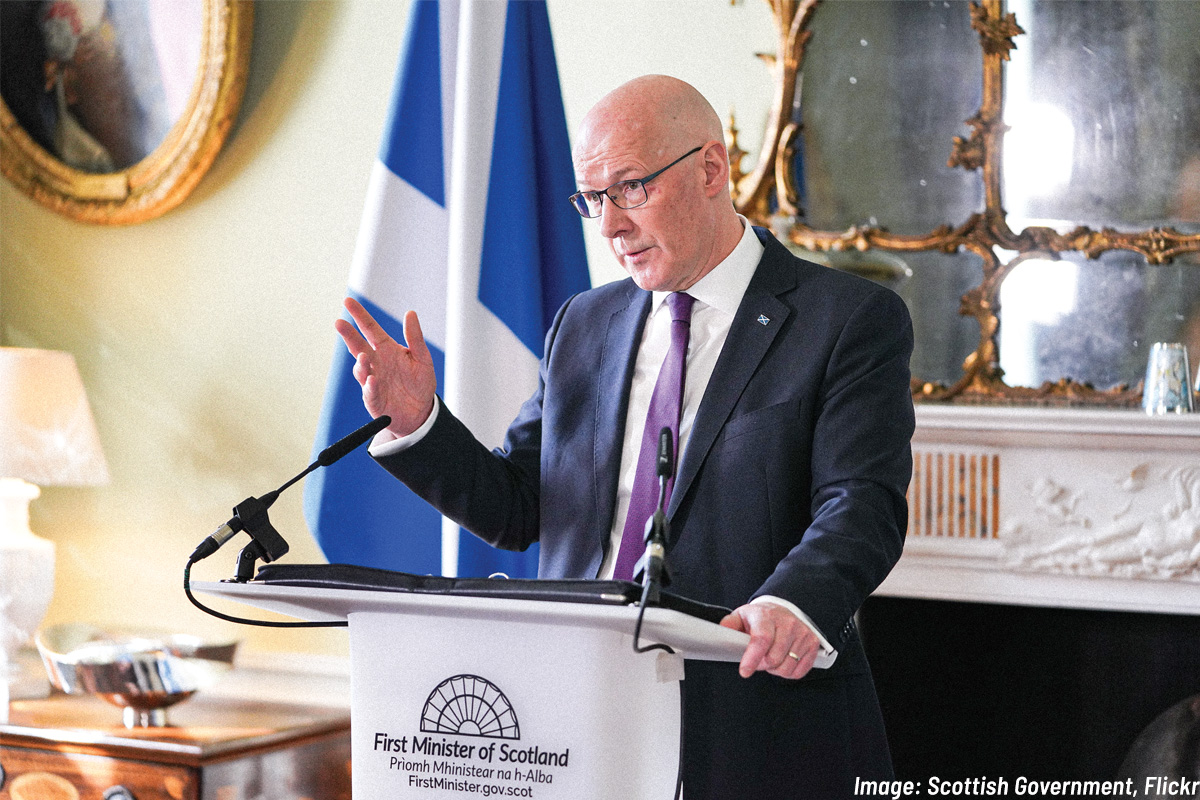We publish here an open letter from Ross Walker of the Edinburgh Marxists, who appeals to those supporting a “Yes” vote – from a leftwing perspective – in the upcoming referendum on Scottish independence. The letter outlines the position of the Marxists, who call for a “No” vote to retain the unity of the working class across Britain in the struggle for international socialist revolution.
We publish here an open letter from Ross Walker of the Edinburgh Marxists, who appeals to those supporting a “Yes” vote – from a leftwing perspective – in the upcoming referendum on Scottish independence. The letter outlines the position of the Marxists, who call for a “No” vote to retain the unity of the working class across Britain in the struggle for international socialist revolution.
Dear “Yes” voters,
In this year’s referendum, many of you will be voting for Scotland to be an independent nation. We understand that this isn’t out of chest-beating nationalism or anti-English chauvinism, or any of the other reasons the (often very cynical) “No” campaign throw around.
We understand that many people are attracted to separation, not from selfish or chauvinistic reasons, but often for seemingly progressive reasons: to undermine the British establishment; to live in a state that might be easier for working class people to influence; or to carry out progressive policies and set an example to the rest of the world. These are some of the reasons often heard by the more progressive side of the “Yes” camp and all these are valid and good reasons. Make no mistake, if Scotland were to become independent, we would support and fight for progressive policies in it.
For unity of the labour movement
We have weighed all these aspects and looked at what independence would do to the labour movement. The British labour movement is by some indicators one of the strongest and oldest labour movement in the world. Every democratic and economic right we have is based on past victories of the working classes, organised in trade unions, whose political representatives were – and still are – to be found in the Labour Party.
We do not kid ourselves that these organisations are perfect or that they do what they were set up to do. We appreciate that the leaders of these organisations, who so many working class people look to, more often than not fail to fulfil their duties. This has a very disarming effect on the labour movement.
Nevertheless we defend resolutely every single gain that has come from collective struggle through these organisations and fight against any attempt to weaken these organisations from outside and inside the movement. History has shown us that the weakening of workers’ organisations, such as trade unions, only benefits capitalism at the expense of the working class.
We consistently call for trade union leaders not to collaborate with the ruling class, but to have faith in its own class and to fight for socialist policies. We also call on these leaders to fight for socialist policies in the Labour Party, so that it speaks on behalf of the working classes within and without the limits of the parliamentary system. Where possible we also work within the Labour Party to put forward the same ideas. But we do all this on the basis of resolutely defending these organisations, their structures and the gains they’ve made in the past – often we are defending them against their own leaderships!
The Scottish National Party, the dominant force of the “Yes” campaign, promise a more business friendly environment with reduced corporation tax. Within the limits of capitalism this is the only way they can put forward a viable case for independence. The SNP, being a party with no links to the working class or trade unions, and funded instead by sections of Scottish business, will always put forward this case. This will mean a direct attack on the living standards working class people have fought for and could lead to the implementation of anti-trade union legislation, not to mention the break up of such organisations along national lines.
Business friendly parties and strong labour movements do not go together. They are as diametrically opposed as labour and capital in general. If we look at the recently privatised economies of eastern Europe with their corruption and ruthless exploitation, as well as the crisis in smaller, weaker European states such as Greece, Portugal, Ireland and Iceland, we can see how this race to the bottom is not compatible with even very basic rights for the working class.
We of course do not say that it will be an end to the labour movement, but no one can deny that significant obstacles will be put in our way through national division. The labour movement and its strength are too important and we cannot vote for something that will undermine the past victories and the potential future strength of the working classes. We also want to see the end of British imperial chauvinism, but feel that the only way to do this is through a united class struggle of the British working class against their own ruling class. There are no shortcuts to this.
No ultimatums; no shortcuts
However we do not give ultimatums. We appreciate that we are a small force and we have very little influence on the outcome of this election. We do not gamble on either result. If the electorate does vote “Yes”, our principles will not change. We will carry on fighting for socialist ideas within the labour movement in an independent Scotland. We defend the right of the Scottish people to determine their own fate. We want unity of the working classes of these isles – but only a voluntary unity – and are against forced unity.
A big concern is the amount of hope people are putting into the outcome of this referendum. Jim Sillars, when recently asked on Question Time about what would happen in a “No” vote, replied by stating that the people who vote “No” will regret it for the rest of their lives. This kind of ultimatism expressed by Sillars is not unique to him. It is in fact expressed throughout the “Yes” camp in both left and right sides. This attitude may be acceptable for a retired successful career politician with nothing to lose but his ego, but is not ok for the Scottish working classes and youth who will have to bear the effects either way. The “No” camp are also very guilty of this; both its left and right are unable to give any answers to what indeed will happen if there is a “Yes” result.
The masses of Scottish voters are in a predicament. No matter what way they vote they will be blamed for anything that goes wrong. Under this capitalist system power does not belong to the electorate but to the owners of big business and their agents in the nation states. However as with all parliamentary referendums the illusion of democracy will be used to carry out very undemocratic actions. The mantra from the parliamentary politician will be: you voted for this so now we need to make this cut/legislation etc. to carry through “your wishes”. This is the price you pay for democracy. You’ve had your say, now sit back and let the “professionals” do their job.
Nevertheless we do defend the right of a nation to self-determination. Even this limited form of determination is not enjoyed by all nations. Its existence was gained not through the will of the ruling classes or imperialist states but through the struggle of oppressed peoples.
The problem is profit
Whether you decide to vote Yes or No we ask you to consider three cases.
The first being very much an economic case, that of North Sea oil. We understand that not all nationalists are basing the success of Scotland on this oil, but this example can be applied to almost any industry. The discovery of North Sea oil was both a very dangerous and amazing discovery. There is a huge potential for North Sea oil. Under capable hands it can be used to fund progressive things, and under incapable hands it can be a source of destruction.
Since its discovery, North Sea oil has been very much in incapable, bourgeois profiteering hands. Health and safety, employment, the future and the environment are all secondary factors to that of immediate profit. There have been accidents like Piper Alpha. The reason there hasn’t been more is because elements of public and workers control within the industry. Expectations and demands learned by the working classes previous to the discovery were put on the industry from day one. Health and safety legislation were implemented due to pressure from unions within and without the industry. Workers in the industry have a certain amount of rights and power behind them to at least speak out when they see something inefficient or dangerous, and it is thanks to this that the industry has survived. However it has no progressive future under capitalism.
The only way this industry can go forward is under complete nationalisation and complete workers control. Profit must be taken out of the equation. This same principle can be applied to any industry. In some industries the effects of capitalist exploitation may not be so obviously devastating, but in order for any sector to run efficiently, whether it be oil, mines, mobile phones, mills, distilleries or anything else, it must be run by those who produce it and those consume it. Profit must be completely withdrawn as a force.
Our second case is one of culture. Marxists are often portrayed as being economically obsessed and not concerned about individuality and culture. This is nonsense. Culture is vital to all human beings. Humans cannot live by bread alone. However we do recognise the vital material basis to culture. Take for example the very old Scottish language, Gaelic. A lovely language and once the dominant language of the Scottish highlands and beyond. It is now spoken by only around 1% of Scotland.
Culture under capitalism
The dominant languages of the world – English, French, German, Chinese and Spanish are all of course very nice and interesting languages, but that’s not why they’re the dominant languages. They are spoken worldwide because that’s what the market demands, and if capitalism demands it then the state education system will demand it. The option of learning Gaelic for the majority of Scots who aren’t raised near Gaelic schools is reduced to a hobby and pastime, and that’s the crux of the matter with all culture.
The accessibility of culture is only available to those who have time and resources and in this system it is dominated by the wealthy few. The vast majority of working class people are too busy, too tired and too poor to give culture the input it deserves. With the decline in the economy and the attacks made to the working class, this situation can only get worse.
We do care about Scottish culture. We care about the cultures of all peoples; but under capitalism culture cannot be sustained and progressed for the majority of people. We urge “Yes” voters to think of this. Will independence lead to a situation where people have more time to develop culture? We say that in order for any culture to survive – whether it be Scots Gaelic, Ceilidhs, sports, music, anything – there must be the input and involvement of the masses, and for mass input we need socialism. Socialism, however, cannot be implemented in Scotland alone, and will not be brought closer by voting for independence on a capitalist basis.
For international socialism
My third and final case is a huge issue – that is the issue of nuclear arms. With independence Scotland will be able to remove all British nuclear arms in the country. This, of course, would be great. No nuclear arms throughout the world would be a huge step forward for humanity, and according to some, Scotland could show an example and start off a trend.
Marxists also want rid of nuclear arms. But we must look at why such arms exist. The old excuse of the Cold War era Western statesmen’s excuse is that they are a deterrent and will stop us being attacked, to which we reply, “why do so many people want to attack Britain?” This is because of the British state and its ruling class’ history of colonising, butchering and impoverishing people. Why has this happened and why is it still happening? Because it is profitable. Because rich, powerful people have vested interests in this and until this stops, Britain will always be under threat. If it is attacked it will be the innocent working classes who will suffer.
Marxists are not pacifists. We do not deny the existence of violence and potential violence. We appreciate that oppressed people must defend themselves through whatever means necessary. However, we aim for a world where the economic and material basis for violence no longer exists. The only way we can really carry out nuclear disarmament is to take the control of all arms out of the profiteers and maniacs that have them and to bring them under the full democratic mass control and full accountability of the people.
Simply removing nuclear arms from Scotland – which we would indeed support – in itself will do nothing to end imperialism and war. Actually, rather than a world more divided along national lines, we need to end nation states and national antagonisms through world revolution and international working class solidarity, in order to bring an end to war and the threat of nuclear weapons.
Don’t mourn – organise!
As mentioned we are aware of our small influence. We don’t take this personally and we fully expect this to change. It is consequently our task not to pretend that we can influence the outcome of the election, but to offer a sober analysis to socialists and left-wingers of the realities of the question of Scottish independence. If the referendum does yield a “Yes” victory, do not think this is the final victory because it certainly will not be. Class struggle will continue and will probably become more difficult and more important post election.
If there is a “No” vote, don’t get demoralised. Don’t sulk. Neither will this be the end of class struggle. On the contrary, class struggle in the British Isles will tend to increase in scope and militancy. Either way, the Marxists will be there alongside you in the everyday trade union struggles and the fight for socialism.
Comrades, the only way forward culturally, economically, politically, and even morally, is through international revolution lead by the working classes. This may seem abstract, but the reality for the future of humanity really is socialism or barbarism. What does capitalism offer the youth of the world today?
Every advance along this road – every victory for the working classes – has been and will continue to be a victory, and we will support and fight for each one progressive step, no matter how small. This does not stop us, but indeed helps us, to fight for the final victory: a successful and sustainable international revolution lead by the working classes. We have full faith that our class – with armed with the correct ideas of a socialist programme – can fulfill this task, no matter what the result of the referendum. Do not look to your nation for a way out. Look to your class.






